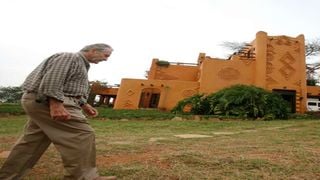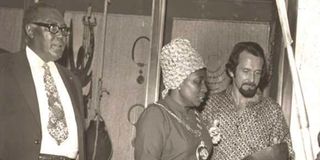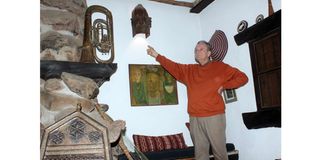
Alan Donovan walks towards his African Heritage House. He died in his sleep Sunday morning aged 83.
News
Premium
Alan Donovan: A life of preserving African Heritage
The American had arrived on the continent more than half a century ago, infused himself into its customs and built a legacy around a way of life he had to learn as an adult through imitation – to become an expert.
When Alan Donovan died in his sleep Sunday morning aged 83, the veteran collector couldn’t have wished for a better legacy. He had lived a long, fulfilling life on the continent he loved the most.
Before he came to Africa as a relief officer with the USAid at the height of Nigeria’s Biafra War in 1967, Donovan had never set foot on the continent. That the continent would become his home for the next 54 years must have seemed at the time a fantasy at best.
But this inaugural visit would change the course of the life of the man, who was instantly affected by Africa’s charm. Donovan would resign from his job two years later to give his life to exploring, collecting and preserving African heritage through extensive travels.
So well versed in African culture was he that he occupied a perch that only “father of heritage”, former Vice President Joseph Murumbi, can lay claim to. Murumbi, a private collector himself, and Donovan, had crossed paths in 1970.
Donovan was in Kenya to host his first exhibition of “arts and material culture” from the Turkana and other people from Kenya’s Northern Frontier. The pair met during the exhibition and after, became friends. This camaraderie would birth the African Heritage.

From left: Joseph Murumbi, former mayor of Nairobi Margaret Kenyatta and Mr Alan Donovan during the opening of the original African Heritage on Kenyatta Avenue.
Few, if any Kenyan collectors, have impacted the country’s heritage in the proportions of the founder of African Heritage Estates, which owns the African Heritage House.
Completed in 1994, this architectural marvel is Africa’s most photographed house, and the archetype of construction finesse. Featuring hundreds of African artefacts, décor and other collectibles, the house is easily one of Donovan’s most prized works. It was opened to the public in 2016 after its gazettement as a national monument.
So rich is his collection that the African Heritage House is one of the few places in the region to be featured on Google Arts & Culture, the virtual museum on Google.
The hideaway is popular for homestays, lunches and sundowner dinners overlooking the Nairobi National Park. Its suites feature 19th century cultural subtleties of different African civilisations, from Lamu to Morocco and Bakuba, to take guests on an experiential tour through history and across the continent.
Activities at the house have been suspended for three days to mourn the founder.
Donovan had, in 2001, set up the Murumbi Trust with a group of well-wishers to preserve the legacy of his friend. He would spend most of his time rehabilitating the collections of Murumbi and his wife Sheila.
These include “The Murumbi Gallery”, a priceless collection that occupies the entire ground floor of the Kenya National Archives. The Murumbi Library has more than 50,000 documents and several thousand books on Africa, many of which were published before 1900.

Founder of African Heritage House Alan Donovan displays artifacts in the house on August 1, 2015.
But what were Donovan’s last days like? What were his wishes?
According to photographer Paul Ekhaba, who worked and travelled extensively with him in his last days, Donovan was in the process of building a new house based on African mud architecture.
Dubbed Gurunsi Memorial House, this facility was to host a collection of African artefacts that the two had recently brought back from the US.
“He was also planning an event next year dubbed ‘Oh Happy Day’ to inaugurate the new house and to celebrate the repatriation of African arts,” Ekhaba told the Nation.
Among Donovan’s wishes was to establish a complete African studies centre in Kenya, Ekhaba revealed.
Said he earlier: “It’s important not only for Kenya but the entire African continent to devote time, energy and funds to establish African study centres to teach the [African way of life] and to [nurture] African experts on African matters.”
He has been mourned as a legend and pioneer African art collector. The former dean of the School of Law at Strathmore University, Prof Luis Franceschi, wrote on Twitter: “Alan Donovan, a man in love with the African soul, soil and sound, a wonderful human being, a defender of African art and African artists.”
Mr George Kegoro, the director of Open Society Initiative of Eastern Africa, said Donovan had promoted African art, music and fashion to the world.
Little wonder then that Donovan was crowned in 2019 as a Yoruba chief, the highest title in the tribe, in a ceremony graced by leading Yoruba chiefs, in honour of his lifelong dedication to preservation of African culture.
Alan was about to release his latest book, Black Beauty Through the Ages, which profiles more than 200 black women.





